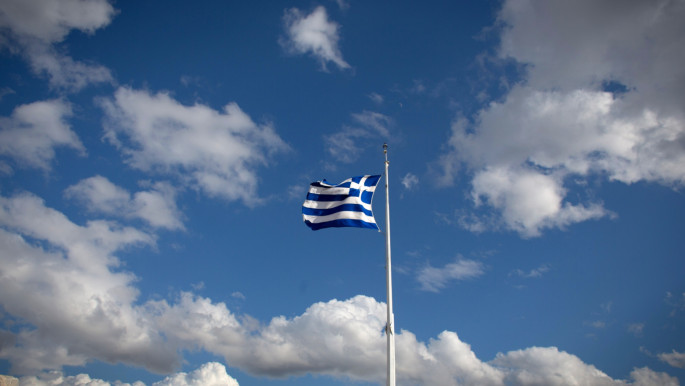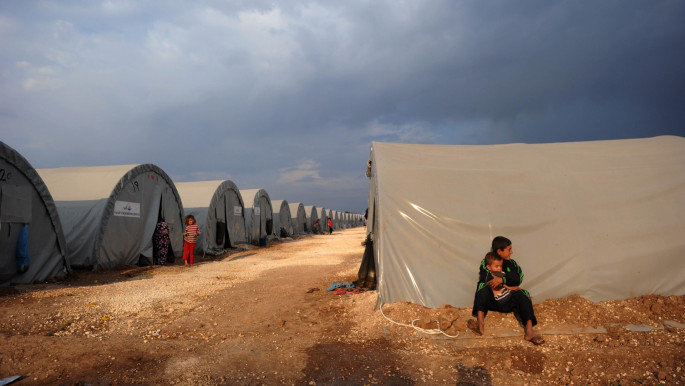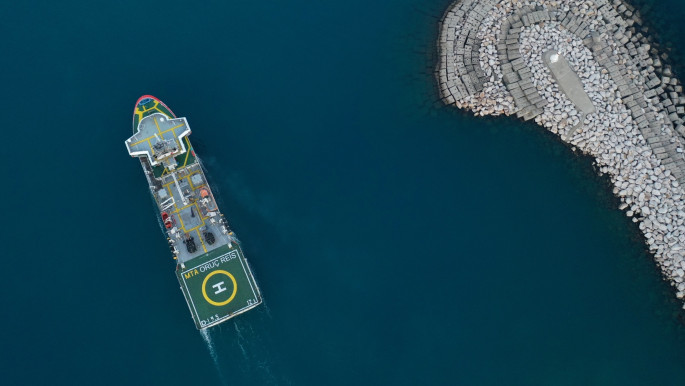The unconvincing narrative of EU sanctions on Turkey
One of the key reasons was the dispute between Turkey and EU member states Greece and Cyprus over the delimitation of maritime zones. Ankara had also been repeatedly accused by Athens and Nicosia of proceeding with unauthorised research and drilling activity in disputed waters.
Greece and Cyprus' pursuit of sanctions was largely in response to what they alleged was Turkish expansionist policies in the Mediterranean, but the results have so far been disappointing for both countries, despite claims in December by the Greek Prime Minister Kyriakos Mitsotakis that the "credibility of the European Union" was at stake.
Despite some symbolic sanctions being discussed at the time, the tone was clearly set in the latest summit of EU leaders which took place via video conference on 25 March 2021, where any indication of plausible EU pressure on Turkey in the future was dismissed.
In the conclusion of the meeting, EU leaders "welcomed the recent de-escalation in the Eastern Mediterranean" due to Turkey's cooperative stance and stressed that "if the current de-escalation is sustained and Turkey engages constructively, and subject to the conditionalities set in previous European Council conclusions, the EU is ready to engage with Turkey in a phased, proportionate and reversible manner to enhance cooperation".
 |
EU-led sanctions on Turkey were being widely discussed in late 2020 following an escalation in the Eastern Mediterranean |  |
Despite the rhetoric, complex economic and political relations between Turkey and prominent EU member states mean that substantial sanctions on Ankara will always be off the table, with the EU's stance all carrot and no stick.
Commercial ties and trade
Ties between the EU and Turkey are not a new phenomenon. In 1963, the European Economic Community (EEC) and Turkey signed the Ankara Agreement laying the foundation for the free movement of specific goods between the parties and consolidating ties which would facilitate the exchange of services, the movement of labour forces and the flow of capital.
 |
|
| Read more: A new chapter in Greece's Middle East military strategy |
The essential evolution of this agreement was the 1995 Customs Union, which actually finalised free economic movement and the elimination of customs for bilateral transactions. The Customs Union has greatly boosted the trade volume between Turkey and EU countries.
For example, trade between Turkey and the EU increased from $33 billion in 1996 to $143 billion in 2020. This number has been steadily rising with a significant boost since the early 2000s, when the Turkish economy went through a dynamic reconstruction and development phase with impressive results.
As of today, Turkish imports from the EU cover 33.4% of the country's total volume while exports to EU countries account for 41.3% of total exports. The figures are even more impressive when observed at a country-by-country level. For instance, Germany has historically been the top destination for Turkish exports, with the annual turnover between the two countries valued at $35 and $40 billion in recent years.
Future prospects for relations between the EU and Turkey are reflected in the conclusions of the recent report from the EU High Representative for Foreign Affairs and Security Policy, Josep Borrell, in which he called to further strengthen the "already substantial economic ties" of the two sides and proposed the "modernization and expansion of the scope" of the Customs Union. Any prospects for sanctions, as per Greek efforts, seem unlikely in the context of this EU position.
 |
Economic and political relations between Turkey and prominent EU member states mean that substantial sanctions on Ankara will always be off the table, with the EU's stance all carrot and no stick |  |
Defence industry and contracts
Another significant aspect which reflects the EU-Turkey special relationship is the fact that a major share of the revenue circulating between the two parties comes from major defence contracts and arms sales. Tight cooperation in such a critical and sensitive sector, where multi-billion contracts are being awarded, has led countries like Germany to adopt a soft policy towards Ankara, regardless of any controversial Turkish decisions.
A massive defence agreement with the German multinational conglomerate ThyssenKrupp was signed over 10 years ago, foreseeing the delivery of six type 214 submarines to the Turkish Navy. This is one of the most expensive Turkish defence contracts, accounting for over $2.5 billion. The major Italian aerospace and defence manufacturer Leonardo, maintains a strong presence in Turkey and is providing a range of state-of-the-art products, from aircrafts and naval weapons to sophisticated radar systems.
The Spanish state-owned shipbuilding company Navantia has overtaken a remarkable contract for the building of an amphibious ship, the TCG Anadolu, which is expected to be delivered to the Turkish Navy in the near future. The political prospects of such deals in the defence sector become clearer when looking at the January meeting between the Turkish Foreign Minister Mevlut Cavusoglou, the Spanish Ambassador to Turkey, Francisco Javier Hergueta, and the Director General of the Eastern Mediterranean branch of Navantia, Pablo Menendez.
Such EU-Turkish agreements in the defence industry, among many others, not only favour continued political coordination at the most senior levels among the countries involved but also generate an impressive revenue for EU countries, which see Turkey as a reliable client state and treat it as such.
 |
|
| Read more: Why Syrian refugees in Turkey urgently need a new EU migration deal |
Special leverage factors
Further to these critical aspects, the millions of refugees temporarily hosted by Turkey are also a permanent negotiation tool. The four million refugees and asylum-seekers currently based in Turkey have been repeatedly instrumentalised by the Turkish President Recep Tayyip Erdogan. With EU countries unable and unwilling to cope with the political impact of massive refugee influxes, this situation creates unparalleled leverage for Turkey.
Another specific aspect in terms of Germany is the Turkish diaspora in the country. Approximately three million people of Turkish origin are based there, making Turks the largest ethnic minority group in the country. As a politically active community, they are certainly taken into account in Germany's policy decision making towards Turkey.
Last but not least is the significant exposure of major EU banking institutions in Turkey. If Germany is concerned about the aforementioned issues, then the European south has another very serious reason to worry. Spain's BBVA, a Spanish multinational financial services company, has lent a massive $60 billion to Turkish borrowers as part of over $85 billion in Spanish loans to Turkey. BNP Paribas of France and Italy's UniCredit are also among the top lenders, with French and Italian loan exposure to Turkey reaching approximately $40 and $20 billion respectively.
 |
The most prominent EU members, countries which are de facto dictating the EU's long-term strategy, are keen to maintain their working relations with Ankara, along with strengthening their important commercial ties |  |
This means that any possible sanctions on Turkey, considering the fragility of the Turkish currency and the vulnerability of the Turkish economy at the moment, could lead to a systemic crisis in the banking system of the European south, possibly creating a domino effect with unmatched consequences.
The most prominent EU members, countries which are de facto dictating the EU's long-term strategy, are keen to maintain their working relations with Ankara, along with strengthening their important commercial ties. Greece and Cyprus, the players who are mostly affected by the expansion of Turkish interests in the region and could press the EU for a different course of action, are watching the developments rather passively so far.
 |
|
| Read more: How Gulf reconciliation could impact the Eastern Mediterranean |
There is no doubt that each state is working according to its national interests and in this sense countries like Germany, Italy, Spain or the Netherlands would not risk their economic interests for the sake of the "credibility" of the Union, as the Greek PM stated in December.
Greece's inability to utilise the appropriate diplomatic tools and leverage in order to push for some EU support has enabled Turkey to adopt an expansionist foreign policy in the Eastern Mediterranean without any substantial reaction from the EU.
There are plenty of examples where EU institutions have promptly enabled strict sanctions on entities and individuals due to political oppression and human rights violations, with Belarus being an interesting example, with 88 individuals, including the country's President Alexandr Lukashenko facing a travel ban and a freeze of their assets. Ankara has been criticised for similar violations, starting from the recent withdrawal from the Istanbul Convention to the imprisonment of political opponents and the violent repression of protests.
Furthermore, the escalation with Greece and Cyprus could be interpreted as the direct questioning of the sovereign rights of two EU member states. Yet no action has been taken, and it boils down to the fact that key EU players will keep securing their vested economic and political interests as long as the impacted parties, namely Greece and Cyprus, fail to adopt a responsible foreign policy towards Turkey.
Alex Kassidiaris is an International Security Advisor based in London. He holds a master's degree from the War Studies Department of King's College London and his research interests include security and politics in the Eastern Mediterranean and Middle East.
Follow him on Twitter: @AlexKassidiaris





 Follow the Middle East's top stories in English at The New Arab on Google News
Follow the Middle East's top stories in English at The New Arab on Google News


